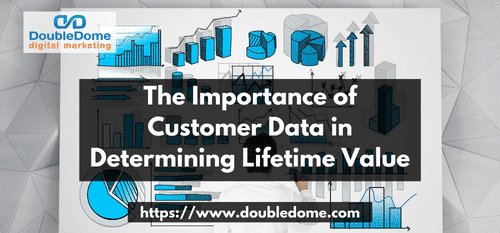One of the most important measurements for any business is the lifetime value (LTV) of a customer. It is a way to figure out how much a customer is worth to a business over the course of their relationship with that business. For businesses to figure out LTV, they need to collect and look at data about their customers. In this blog post, we’ll talk about how important customer data is when figuring out the lifetime value of a customer.

What does “Lifetime Value” mean?
Lifetime value (LTV) is a measurement of how much a customer is worth to a business over the course of their relationship with that business. It looks at how much money a customer brings in over time and how much it costs to get that customer and keep them as a customer.
LTV is an important metric because it shows how much a customer is worth to a business. By figuring out LTV, businesses can figure out which customers are the most valuable and put most of their efforts into keeping those customers. LTV can also help businesses decide how to price, market, and serve customers in a smart way.
Why is it important to know information about a customer’s lifetime value?
For businesses to figure out LTV, they need to collect and look at data about their customers. This data includes information about how customers act, what they like, and what kind of people they are. By looking at this information, businesses can learn more about how customers act and make better decisions about how to get and keep customers.
Customer data is important for figuring out LTV for several reasons:
Understanding Customer Behavior
Customer data can tell you things about how customers act, like how often they buy, what they buy, and when they buy it. This information can be used to divide customers into groups based on their buying habits and create targeted marketing campaigns to get them to buy again.
For example, if a business knows that a customer usually buys something every six months, they can send that customer targeted marketing messages to get them to buy sooner. By understanding how customers act, businesses can improve their marketing and increase the lifetime value of each customer.
How to Find Customers Worth a Lot
You can also use customer data to find out who your most valuable customers are. By looking at data about customers, businesses can figure out which ones bring in the most money and which ones are the most loyal. With this information, you can make targeted marketing campaigns and customer loyalty programs to keep your best customers.
For instance, if a business knows that a customer has bought from them several times over a few years, they can offer that customer special deals or discounts to get them to buy from them again. By figuring out who their most valuable customers are, businesses can put most of their efforts into keeping them and increasing their lifetime value.
Estimating the value of a customer over time
Customer data can also be used to estimate the value of a customer over their lifetime. Businesses can make predictions about how much money a customer is likely to bring in over their lifetime by looking at how they act and what they buy.
Predictive models can be used to find customers who are likely to leave and come up with specific ways to keep them as customers. They can also be used to find ways to make more money from each customer by cross-selling and up-selling.
Making the customer experience better
Lastly, customer data can be used to make the customer experience better as a whole. Businesses can create personalized experiences that meet the unique needs of each customer if they know what they like and how they act.
For example, if a business knows that one of its customers prefers to shop online, it can make its website easy to use and navigate. By making the customer experience better, businesses can increase customer loyalty and retention, which increases customer lifetime value.
In conclusion, customer data is essential for determining lifetime value. By collecting and analyzing customer data, businesses can learn more about how customers act, figure out which customers are the most valuable, predict the customer’s lifetime value, and improve the customer experience as a whole. These insights can be used to make targeted marketing campaigns, loyalty programs, and strategies for keeping customers to increase customer lifetime value and grow the business.








